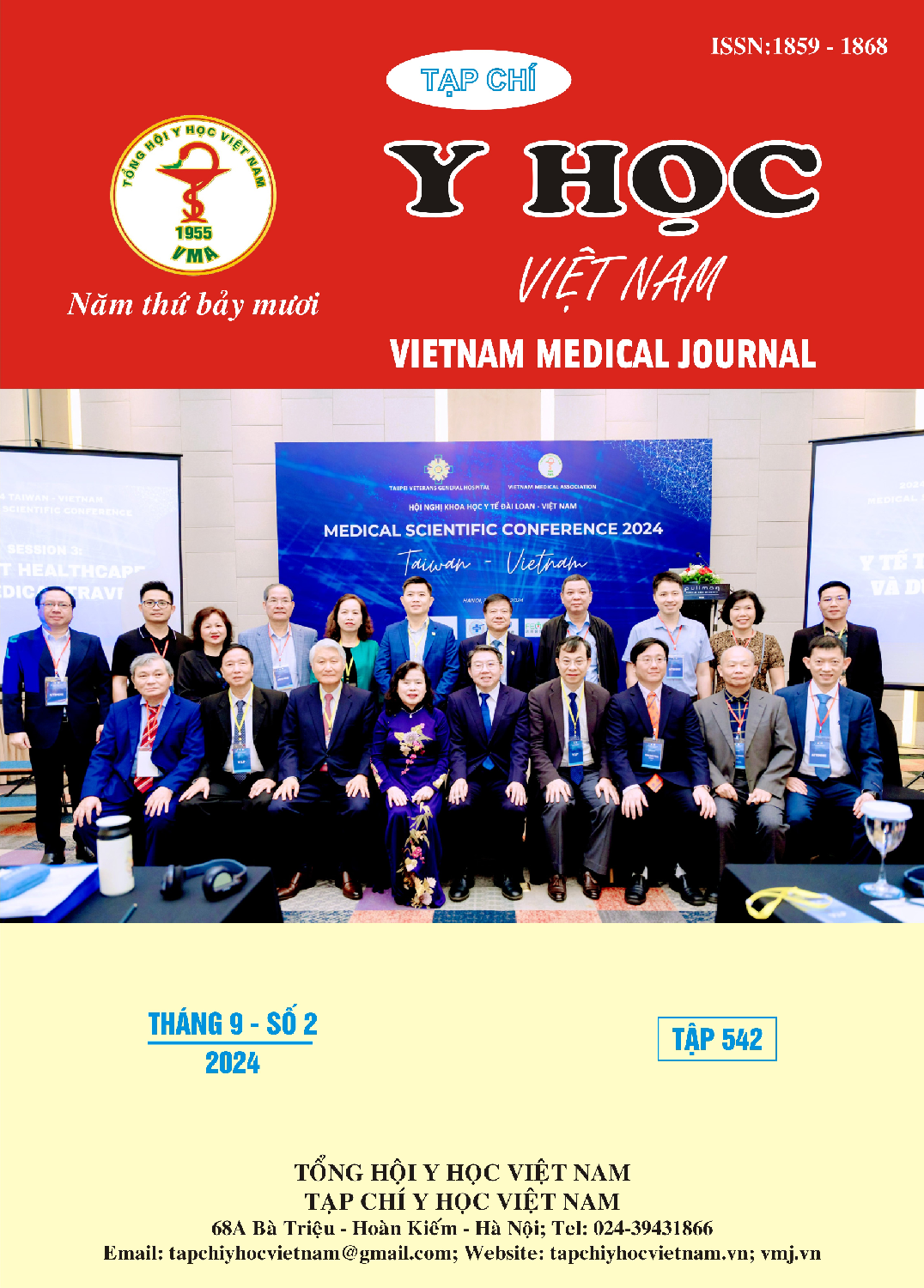EVALUATION OF RESULTS OF FIRST-LINE AFATINIB TREATMENT IN STAGE IV EGFR-MUTATION NON-SMALL CELL LUNG CANCER PATIENTS AT NGHE AN ONCOLOGY HOSPITAL
Main Article Content
Abstract
Objectives: Evaluate the effectiveness of first-line Affatinib treatment in stage IV EGFR-mutation non-small cell lung cancer patients and side effects. Subjects and methods: This is a retrospective, descriptive study at evaluating the results of first-line Afatinib treatment in stage IV EGFR-mutation non-small cell lung cancer patients at Nghe An Oncology hospital. In total, 54 patients were enrolled in the study from January 2020 to May 2024. Results: The average age was 69±10.02 months; the percentage of male was 64.8%, the figure for female was 35.6%. The majority of patients had performance status 0-1, accounting for 83.3%. The proportion of common EGFR mutations and uncommon EGFR mutation were 74% (Del19, L858R) and 26%, respectively. Most patients were started with doses of 30mg (50%) and 40mg (31.5%). The optimal dose was mainly 30 mg, accounting for 70.4%.The Disease Response rate was 77.8%; Disease Control Rate (DCR) was 94.6%. There was no difference in disease response rate with patient characteristics, such as sex, PS, smoking history, histological types, EGFR mutation types.The median progression-free survival (PFS) was 18±2.33 months (95% Confidence interval (CI), 14.29-23,45 months).The common side effects of afatinib included diarrhea (37%), skin rash (22.8%), paronychia (27.8%), stomatitis (27.8%), mainly in grade 1 and grade 2. The rates of skin rash and grade 3-4 paronychia were statistically significantly lower in the <40 mg treatment group compared with the 40 mg dose (p < 0.05).
Article Details
Keywords
Afatinib, stage IV non-small cell lung cancer, EGFR-mutation, side effects
References
2. Ettinger DS, Wood DE, Aisner DL, et al. NCCN Guidelines Insights: Non–Small Cell Lung Cancer, Version 2.2021: Featured Updates to the NCCN Guidelines. Journal of the National Comprehensive Cancer Network. 2021;19(3):254-266. doi:10.6004/jnccn.2021.0013
3. Sequist LV, Yang JCH, Yamamoto N, et al. Phase III Study of Afatinib or Cisplatin Plus Pemetrexed in Patients With Metastatic Lung Adenocarcinoma With EGFR Mutations. JCO. 2013;31(27):3327-3334. doi:10.1200/JCO.2012.44.2806
4. Wu YL, Zhou C, Hu CP, et al. Afatinib versus cisplatin plus gemcitabine for first-line treatment of Asian patients with advanced non-small-cell lung cancer harbouring EGFR mutations (LUX-Lung 6): an open-label, randomised phase 3 trial. Lancet Oncol. 2014;15(2):213-222. doi:10.1016/ S1470-2045(13)70604-1
5. Park K, Tan EH, O’Byrne K, et al. Afatinib versus gefitinib as first-line treatment of patients with EGFR mutation-positive non-small-cell lung cancer (LUX-Lung 7): a phase 2B, open-label, randomised controlled trial. Lancet Oncol. 2016;17(5): 577-589. doi:10.1016/S1470-2045(16)30033-X
6. Tanaka H, Taima K, Itoga M, et al. Real-world study of afatrinib in first-line or re-challenge settings for patients with EGFR mutant non-small cell lung cancer. Med Oncol. 2019;36(6):57. doi:10.1007/s12032-019-1278-9.
7. Huy TL, Anh TĐ. 22. Đánh giá hiệu quả điều trị bước một ung thư phổi không tế bào nhỏ giai đoạn muộn có đột biến gen egfr bằng Afatinib tại Bệnh viện Đại học Y Hà Nội. TCNCYH. 2022; 159(11): 178-186. doi:10.52852/ tcncyh.v159i11.1289.
8. Hằng ng TT, Tú ĐA, Hòa NTT, et al. Kết quả điều trị Afatinib liều linh hoạt ở bệnh nhân cao tuổi UTPKTBN có đột biến EGFR. VMJ. 2024;537(1B). doi:10.51298/vmj.v537i1B.9120.
9. Halmos B, Tan EH, Soo RA, et al. Impact of afatinib dose modification on safety and effectiveness in patients with EGFR mutation-positive advanced NSCLC: Results from a global real-world study (RealGiDo). Lung Cancer. 2019;127:103-111. doi:10.1016/j.lungcan.2018.10.028
10. Kim Y, Lee SH, Ahn JS, Ahn MJ, Park K, Sun JM. Efficacy and Safety of Afatinib for EGFR-mutant Non-small Cell Lung Cancer, Compared with Gefitinib or Erlotinib. Cancer Res Treat. 2019;51(2):502-509. doi:10.4143/crt.2018.117


